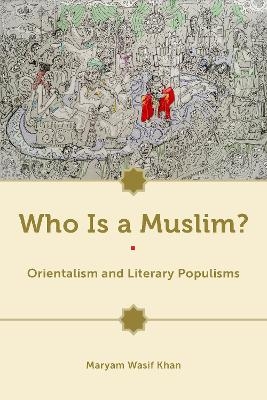
Who Is a Muslim?
Orientalism and Literary Populisms
Seiten
2021
Fordham University Press (Verlag)
978-0-8232-9013-0 (ISBN)
Fordham University Press (Verlag)
978-0-8232-9013-0 (ISBN)
Who is a Muslim? destabilizes traditional constructions of postcolonial literary histories through the specific example of Urdu by suggesting that this North-India vernacular, far from secular or progressive, has been shaped as the authority designate around the intertwined questions of piety, national identity, and citizenship.
Who Is a Muslim? argues that modern Urdu literature, from its inception in colonial institutions such as Fort William College, Calcutta, to its dominant iterations in contemporary Pakistan—popular novels, short stories, television serials—is formed around a question that is and historically has been at the core of early modern and modern Western literatures. The question “Who is a Muslim?,” a constant concern within eighteenth-century literary and scholarly orientalist texts, the English oriental tale chief among them, takes on new and dangerous meanings once it travels to the North-Indian colony, and later to the newly formed Pakistan. A literary-historical study spanning some three centuries, this book argues that the idea of an Urdu canon, far from secular or progressive, has been shaped as the authority designate around the intertwined questions of piety, national identity, and citizenship.
Who Is a Muslim? argues that modern Urdu literature, from its inception in colonial institutions such as Fort William College, Calcutta, to its dominant iterations in contemporary Pakistan—popular novels, short stories, television serials—is formed around a question that is and historically has been at the core of early modern and modern Western literatures. The question “Who is a Muslim?,” a constant concern within eighteenth-century literary and scholarly orientalist texts, the English oriental tale chief among them, takes on new and dangerous meanings once it travels to the North-Indian colony, and later to the newly formed Pakistan. A literary-historical study spanning some three centuries, this book argues that the idea of an Urdu canon, far from secular or progressive, has been shaped as the authority designate around the intertwined questions of piety, national identity, and citizenship.
Maryam Wasif Khan is Associate Professor of Comparative Literary and Cultural Studies at the Mushtaq Gurmani School of Humanities and Social Sciences, LUMS University, Lahore.
Note on Transliteration | ix
Introduction: Who Is a Muslim? | 1
1 Mahometan/Muslim: The Chronotope of the Oriental Tale | 21
2 Hindustani/Urdu: The Oriental Tale in the Colony | 53
3 Nation/Qaum: The “Musalmans” of India | 87
4 Martyr/Mujāhid: Muslim Origins and the Modern Urdu Novel | 126
5 Modern/Mecca: Populist Piety in the Contemporary Urdu Novel | 165
Epilogue: Us, People / People Like Us: Fehmida Riaz and a Secular Subjectivity in Urdu | 209
Acknowledgments | 221
Notes | 225
Index | 255
| Erscheinungsdatum | 20.11.2020 |
|---|---|
| Verlagsort | New York |
| Sprache | englisch |
| Maße | 152 x 229 mm |
| Themenwelt | Geisteswissenschaften ► Geschichte ► Regional- / Ländergeschichte |
| Geschichte ► Teilgebiete der Geschichte ► Religionsgeschichte | |
| Geisteswissenschaften ► Sprach- / Literaturwissenschaft ► Anglistik / Amerikanistik | |
| Geisteswissenschaften ► Sprach- / Literaturwissenschaft ► Literaturwissenschaft | |
| ISBN-10 | 0-8232-9013-1 / 0823290131 |
| ISBN-13 | 978-0-8232-9013-0 / 9780823290130 |
| Zustand | Neuware |
| Informationen gemäß Produktsicherheitsverordnung (GPSR) | |
| Haben Sie eine Frage zum Produkt? |
Mehr entdecken
aus dem Bereich
aus dem Bereich
Von den Anfängen bis zur Gegenwart
Buch | Hardcover (2022)
C.H.Beck (Verlag)
34,00 €
Herkunft, Blüte, Weg nach Osten
Buch | Hardcover (2024)
C.H.Beck (Verlag)
39,00 €


